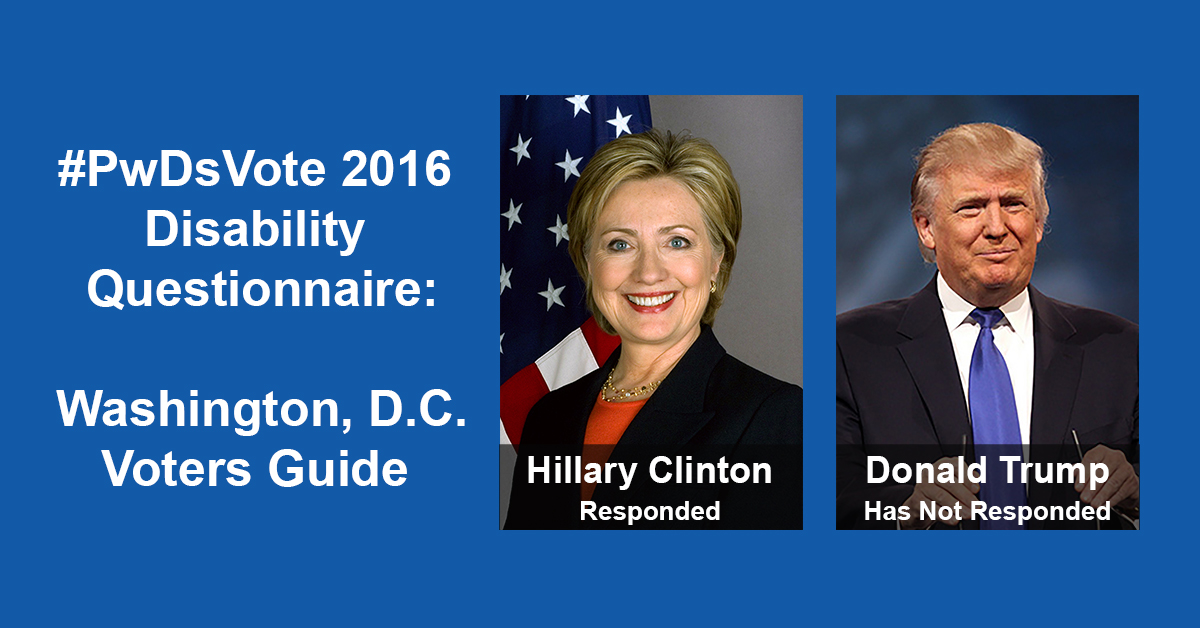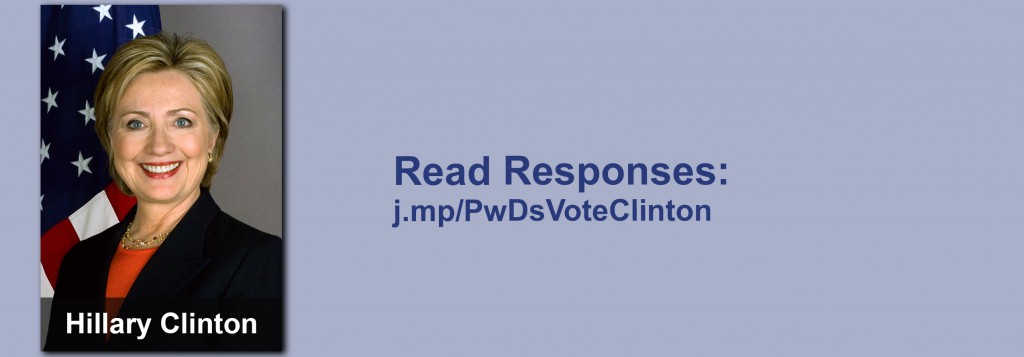Washington, Oct. 19 – As voters get ready to head to the polls in Washington, D.C., RespectAbility is releasing its Washington, D.C.,’s Disability Voter Guide for the upcoming presidential election. Democrat Hillary Clinton has completed the #PwDsVote Disability Campaign Questionnaire, but Republican Donald Trump has yet to do so.
The #PwDsVote 2016 Campaign Questionnaires were designed by and for people with disabilities (PwDs) and those who love them to know where candidates stand on key issues. RespectAbility is nonpartisan and does not endorse candidates. The questionnaires are purely for educational purposes as voters go to the polls.
The presidential questionnaire was created during the primary season and asked all of the presidential candidates to comment on 16 disability questions. Former Secretary of State Hillary Clinton responded by addressing all of the questions. Despite numerous requests in person and by phone and email, the Trump campaign has not yet filled out the questionnaire. The American Association of People with Disabilities and the National Council on Independent Living also has a nonpartisan presidential questionnaire, which both Clinton and Trump have completed. Libertarian Gary Johnson and Green Party candidate Jill Stein have not filled out either questionnaire but Stein recently did speak about disability issues during a campaign stop in Texas.
Twenty-six candidates for Senate, as well as eleven candidates for governor, from both sides of the aisle (22 Democrats, 14 Republicans, 1 Green Party) also completed the down ballot questionnaire, showing that disability rights is a nonpartisan issue. An additional nine candidates responded that they are not completing any questionnaires during this campaign season. The responses also are geographically-diverse, coming from states all around the country, as politicians are paying more and more attention to the disability community.
Washington, D.C., Needs to Improve Outcomes for Citizens with Disabilities
There are 44,504 Washingtonians with disabilities who are between the ages of 18-64. When looking at young people with disabilities, there are 4,800 youth ages from 16-20 with disabilities. More than 11,000 Washington D.C., students have Individualized Education Programs (IEPs). However many Washingtonians with disabilities have not yet received a disability diagnosis they need, and thus are not yet receiving the school accommodations and supports that they need to succeed. Many students who might need support to succeed academically instead find themselves trapped into a lifetime of poverty or flowing down to the school prison pipeline.
Today Washington, D.C., has the opportunity to work hard to improve outcomes in terms of competitive, integrated employment for people with disabilities. Currently 30.3 percent of working-age Washingtonians with disabilities are employed compared to 73.5 percent of those without disabilities. View the rankings of all 50 states and compare.
America has 1.2 million youth with disabilities, between the ages of 16 and 20. Each year 300,000 of them age into what should be the workforce, but stigmas and lack of knowledge about the capabilities of people with disabilities means that most do not find employers willing to hire them. Young adults with disabilities in all of these states are hoping to find work. They have high expectations and deserve the opportunity to achieve the American dream. Young people with disabilities may simply need some thoughtful help to transition into the workforce. See data on all 50 states here: State Data.
RespectAbility President Jennifer Laszlo Mizrahi said, “Our community is looking for jobs so we can achieve the American dream, just like anyone else. It is vital for us to know where the candidates stand on economic, stigma, education, safety, transportation, housing, healthcare, foreign affairs and other issues.”
Fully one-out-of-five Americans have a disability, and 52 percent of likely voters have a loved one with a disability. Only 34 percent of working-age Americans with disabilities nationally have jobs, despite the fact that the vast majority want to work. More than 11 million working age people with disabilities are now living on government benefits in our country.
According to a new report from Rutgers University, 35.4 million people with disabilities will be eligible to vote in the November 2016 elections, representing close to one-sixth of the total electorate. That’s an increase of nearly 11 percent since 2008.
Remember to Vote
Washington D.C., residents can vote for the candidates of their choice either on the standard voting schedule or through early voting. Washingtonians had until Oct. 11, 2016, to register to vote for the presidential general election. Voters can cast an early vote between Oct. 22 and Nov. 4. Learn more here: Early Voting. Individuals also can use an Absentee Ballot to vote, which has to be received by Nov. 8.





Be First to Comment